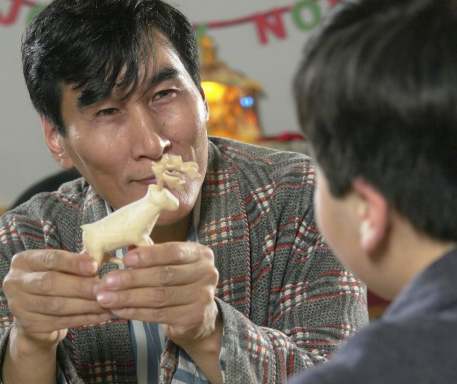 Sylvain
Richard is a film critic at Arts & Opinion. He
gave Necessities of Life, which played at Montreal's
2008
Montreal World Film Festival, 3.6 out of 4
stars. For the rest of his ratings, click
HERE.
Sylvain
Richard is a film critic at Arts & Opinion. He
gave Necessities of Life, which played at Montreal's
2008
Montreal World Film Festival, 3.6 out of 4
stars. For the rest of his ratings, click
HERE.
 It
would be interesting to track what percentage of modern film
deals with borders or situations that bring into play different
cultures and belief systems, or what Samuel Huntington has
memorably (pessimistically) coined as ‘the clash of
civilizations.” Since we all read the papers and/or
partake of e-journalism, we know that in real life the mixing
of cultures doesn’t always produce a happy out come,
just as most films that attempt to deal with this very sensitive
and tricky subject fall short of excellence. Among those that
have recently impressed are the films of Fatih Akin (Head-On,
The Edge of Heaven) and Secret of the Grain
by Abdellatif Kechiche. Even more outstanding is The Necessities
of Life, which played at the 2008 Montreal World Film
Festival and which won Benoît
Pilon the 2009 Genie Award for best director, Bernard Emond
for best screenplay and Natar Ungalaaq as best actor.
It
would be interesting to track what percentage of modern film
deals with borders or situations that bring into play different
cultures and belief systems, or what Samuel Huntington has
memorably (pessimistically) coined as ‘the clash of
civilizations.” Since we all read the papers and/or
partake of e-journalism, we know that in real life the mixing
of cultures doesn’t always produce a happy out come,
just as most films that attempt to deal with this very sensitive
and tricky subject fall short of excellence. Among those that
have recently impressed are the films of Fatih Akin (Head-On,
The Edge of Heaven) and Secret of the Grain
by Abdellatif Kechiche. Even more outstanding is The Necessities
of Life, which played at the 2008 Montreal World Film
Festival and which won Benoît
Pilon the 2009 Genie Award for best director, Bernard Emond
for best screenplay and Natar Ungalaaq as best actor.
Set
in the early 1950s during the tuberculosis epidemic that devastated
Canada's unvaccinated aboriginal peoples, Tiivii, an Inuit
hunter played by Natar Ungalaaq, who starred in Zacharias
Kunuks’ acclaimed Atanarjuat: the Fast Runner,
is sent to a Quebec sanatorium for a cure. Rudely (without
his consent) uprooted from his home, weakened from illness,
unable to understand the language and culture, he has, to
all intents and purposes, given up on life and is preparing
to die. But his compassionate nurse, played by the sublime
Éveline Gélinas, will not allow this to happen.
She arranges for an Inuit boy, Kaki, to be transferred to
the sanatorium. The relationship becomes mutually enriching
as the boy helps Tiivii understand white man’s culture
while the latter discovers a reason to live in passing on
Inuit tradition to Kaki.
Without
overplaying the racist card, the tension of the film is sustained
by the everyday, almost reflexive intolerance exhibited by
groups of people when introduced to someone from foreign culture.
Pilon holds up a mirror to an aspect of racism that doesn’t
make headlines, but is the kind many of us unwittingly bring
to the table, that allows everybody to be seated at the table
so that the ignorance upon which the intolerance is based
cannot withstand the necessary give and take that transpires
among people sharing a common place (the sanatorium) and common
fate (their illness). The viewer, like the TB patients, comes
to accept Tiivii in proportion to his gradual but inevitable
demystification. As the latter explains Inuit culture to the
boy Kaki, everyone becomes party to his sincerity, decency
and humanity -- the effects enhanced by striking cinematography
that contracts the dreamlike scenes of Quebec’s north
against the claustrophobic confines of the sanatorium.
The
Necessities of Life is Benoît
Pilon’s first feature film, which followed his highly
regarded documentaries Roger Toupin:: Epicier Varite
and Nestor et les Oublier. In the spirit of the very
gifted Pedro Almodóvar (Talk to Her, All About
My Mother), Necessities is about possibilities,
about relationships forming against the odds, against all
preconceptions, where what is best in human beings cannot
help but to manifest no less than nature springing eternal
after a long and hard winter -- and without a trace of didacticism.
That this eloquent and most satisfying film made the Academy’s
shortlist of nine contenders in the Best Foreign Language
film category, but did not make the final cut is an injustice
that will not diminish its excellence nor its meaning for
those who make the effort to see it.
For
the ratings of 2008 Montreal World Film Festival, HERE.